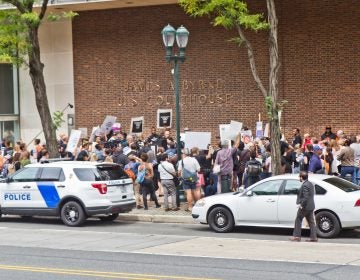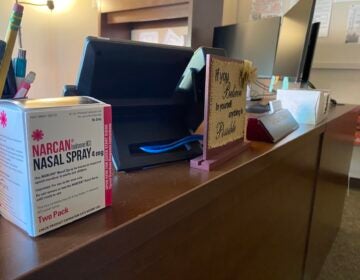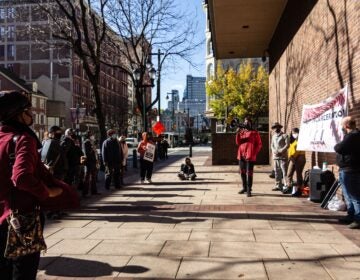Safehouse debate in appeals court centers on two sentences in ‘crackhouse statute’
The question of whether the Philadelphia nonprofit can open a supervised injection site comes down to language in the U.S. Controlled Substances Act.

Elise Schiller holds a photo of her daughter Giana Natali, who died of an overdose in 2014, at a rally in support of Safehouse, a proposed supervised injection site in Philadelphia. (Kimberly Paynter/WHYY)
The question of whether the nonprofit Safehouse can open a supervised injection site in Philadelphia comes down to two sentences in the U.S. Controlled Substances Act.
In Monday’s oral arguments, a panel of three 3rd Circuit Court of Appeals judges drilled into the language of those sentences, pressing both U.S. Attorney William McSwain and Ilana Eisenstein, the attorney representing Safehouse.
The law makes it illegal for anyone to maintain a place for the purpose of storing, using or selling drugs, and is commonly known as the “crackhouse statute.” The legislation was authored by then-Sen. Joe Biden, among others, as a tool to more efficiently tamp down on drug use during the height of the crack epidemic. The statute reads that it shall be unlawful to:
(1) knowingly open, lease, rent, use, or maintain any place, whether permanently or temporarily, for the purpose of manufacturing, distributing, or using any controlled substance;
(2) manage or control any place, whether permanently or temporarily, either as an owner, lessee, agent, employee, occupant, or mortgagee, and knowingly and intentionally rent, lease, profit from, or make available for use, with or without compensation, the place for the purpose of unlawfully manufacturing, storing, distributing, or using a controlled substance
McSwain began by attempting to unravel the decision of U.S. District Judge Gerald McHugh, who ruled that Safehouse did not violate the statute, in part, because Congress did not have these types of facilities in mind when it wrote the Controlled Substances Act 35 years ago. McSwain said that shouldn’t matter — that the statute was broader than McHugh gave it credit for.
The appeals court judges offered several other hypothetical situations, to see if the statute would apply there.
What if a landlord knew a tenant was using his or her rental space to do drugs? Would the landlord be in violation of the statute?
McSwain said no, because that drug use is incidental — the primary purpose of the home is still to live there.
The judges tweaked the premise: What if it’s a storage unit, not a home, where the tenant is doing drugs?
In that instance, McSwain said, the statute would not apply directly because it wouldn’t facilitate the type of concentrated drug use Congress was trying to prevent.
What if the person brought a friend? Two friends?
For McSwain, the hypothesis inched closer to illegal with each adjustment.

Much of the debate centered on whose “purpose” is being referenced in each clause of the statute: that of Safehouse, or the person using drugs.
McSwain’s argument hinged on the condition that the “purpose” in the first clause applies to Safehouse. In the second clause, he said, it refers to the purpose of the person using drugs. In that first clause, he argued, Safehouse’s primary purpose is to facilitate drug use, a claim that Judge Jane Roth pushed back on. She noted that Safehouse plans to not only offer a consumption room but also offer treatment and syringe exchange programs.
McSwain asserted that drug use on site is the necessary precondition for Safehouse to exist.
“There would be no call for it if it didn’t have a consumption room,” he said, noting that the other services Roth mentioned were available at existing sites such as Prevention Point, the city’s only syringe exchange program.
Eisenstein, representing Safehouse, took issue with the argument that drug use was the nonprofit’s raison d’etre.
“The necessary precondition of Safehouse’s existence is not drug consumption, it’s the overdose crisis,” she said.
Eisenstein said that the key feature of addiction as a disease is that it makes people unable to stop consuming drugs. It follows, then, that Safehouse’s purpose is not to promote drug use, she said, but to offer medical care on-site for the drug use that would already be happening as a function of the users’ disease.
“Why are they coming to Safehouse instead of remaining in their home?” asked Eisenstein. “Mr. McSwain suggests it’s because they’re more comfortable. But the distinguishing feature of Safehouse is the availability of lifesaving care.”

McSwain did, for the second time, acknowledge that a mobile unit offering Safehouse’s services would, in his view, not be a violation of the statute since the act primarily concerns real estate.
In his rebuttal, McSwain claimed Safehouse was arguing for policy changes, which he may not disagree with, but that the law, as written, simply prevents.
“We’re on the same side of Safehouse in that we’re very concerned about the opioid epidemic,” he said. “We’re trying to do everything we can to fight that and save people’s lives, but it has to be done within the bounds of the law. I don’t think I’m being cynical by saying that, I think I’m doing my duty by saying that.”
Among the few moments revealing any hint at how the panel may be inclined to rule was when Judge Thomas Ambro, a Clinton-appointee, expressed a similar sentiment.
“You’re right, lives may be saved,” he told Eisenstein. “And there’s a really wonderful motive behind what Safehouse is doing, but we’re stuck with the words of the statute.”
It was unclear when a decision would come down, and the timeline is relevant to the case because President-elect Joe Biden is likely to replace McSwain in the U.S. attorney’s post come January.
Whether the Biden administration will drop the case is unknown. The Joe Biden of 35 years ago was a staunch promoter of harsh drug laws — McSwain even quoted him in his oral arguments in district court to demonstrate Congress’s intention when writing and then updating the statute.
As recently as the early 2000s, Biden advocated during Senate hearings that the statute be expanded so it would apply to buildings hosting raves. “The promoter, the guy who owned the building, I’d put the son of a gun in jail!” he said.
The former vice president has since softened his tone on the war on drugs, acknowledging the racial injustices that resulted from the sentencing disparities between crack and powder cocaine in his 1985 legislation and introducing a new bill to eradicate the difference. His language about addiction has changed, too, especially in the context of his son Hunter’s struggle with it.
Still, Biden’s plan to end the opioid epidemic is light on harm reduction strategies: It makes only one mention of syringe exchanges, and no reference to supervised injection sites.

Get daily updates from WHYY News!
WHYY is your source for fact-based, in-depth journalism and information. As a nonprofit organization, we rely on financial support from readers like you. Please give today.





